Texas Tech University Archives
Distinguished Women Red Raiders
Beginning in 2014, the University Archives sponsors a "Women Who Shaped Texas Tech" exhibit as part of Women's History Month, which is celebrated each March. The women selected for the exhibit meet 2-3 of the following criteria: 1) they qualify as either a "groundbreaker" and/or a "first" in Texas Tech history, 2) they have a long-lasting legacy at the university [Many often have a long-lasting legacy in their community as well], and 3) they are documented in the holdings of the University Archives either in the form of photographs, manuscript collection(s), A/V collections such as oral histories, reference files and/or faculty files.
More about the achievements of women at Texas Tech can be found on the TTU Women's Timeline as well as a brief summary of the annual women's exhibit for 2014-2016.
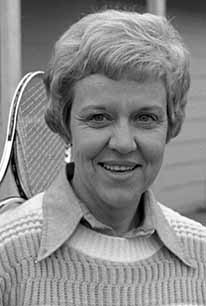 Joyce Davis Arterburn originally hailed from Denver City, Texas, before her family moved to Lubbock while she was in high school. She attended Texas Tech, earned a bachelor’s degree in physical science in 1954, and worked in the physical education department for 37 years. The following year, she married Tech football player E.F. “Junior” Arterburn, Jr. In 1966, she earned her master’s in physical education from Texas Tech.
Joyce Davis Arterburn originally hailed from Denver City, Texas, before her family moved to Lubbock while she was in high school. She attended Texas Tech, earned a bachelor’s degree in physical science in 1954, and worked in the physical education department for 37 years. The following year, she married Tech football player E.F. “Junior” Arterburn, Jr. In 1966, she earned her master’s in physical education from Texas Tech.
In 1976, she became the first faculty sponsor (along with Dr. Bill Marshall of the Physics Department) for the High Riders student organization. The group was initially founded as a female counterpart to the Saddle Tramps and to support women’s athletics, as well as minor men’s sports. Arterburn sponsored the organization for over twenty years and, under her influence, the High Riders began many traditions that are still part of the organization today. For instance, while she was the advisor for the group, the High Riders began ringing the Victory Bells and participating as Raider Red, two responsibilities only the Saddle Tramps previously carried out. During Arterburn’s sponsorship, the High Riders also began taking part in Carol of Lights and homecoming events.
In 1984, Arterburn was promoted from Instructor to Assistant Professor and received tenure. She continued to teach in the physical education department until her retirement in 1996. Arterburn was named Woman of the Year by Mortar Board and the Women in Communications Inc. in 1981, and was inducted into the Texas Tech Athletic Hall of Honor in 2003.
Related collections within the University Archives and the Southwest Collection holdings:
Joyce Davis Arterburn faculty file, 1960-1990
Joyce Davis Arterburn reference file
Margaret E. Wilson Papers, 1935-2007
- file on Joyce Arterburn, 1954-2003
See also:
Maeley Herring, “A True Legacy,” Texas Techsan magazine, January/February 2020, p. 26-29.
 Born in Pampa, Texas, on January 28, 1960, Sharon Moultrie Bruner was a competitive track and field athlete
in high school. During her first year at Texas Tech in 1979, she earned a full athletic scholarship after competing
on the women’s track team as a walk-on and, over the course of the next three years, distinguished herself as a
standout student and athlete. In 1981, Moultrie became the first African American as well as the first female athlete to
be elected Homecoming Queen. She was also the first Texas Tech female athlete to earn All-American honors,
for long jump in 1981 and 1982, and was a seven-time NCAA qualifier in sprint and jumping events. In April of 1982,
she won the Outstanding Senior Athlete Award, one of the university’s top women’s athletic prizes.
Born in Pampa, Texas, on January 28, 1960, Sharon Moultrie Bruner was a competitive track and field athlete
in high school. During her first year at Texas Tech in 1979, she earned a full athletic scholarship after competing
on the women’s track team as a walk-on and, over the course of the next three years, distinguished herself as a
standout student and athlete. In 1981, Moultrie became the first African American as well as the first female athlete to
be elected Homecoming Queen. She was also the first Texas Tech female athlete to earn All-American honors,
for long jump in 1981 and 1982, and was a seven-time NCAA qualifier in sprint and jumping events. In April of 1982,
she won the Outstanding Senior Athlete Award, one of the university’s top women’s athletic prizes.
After graduating in the spring of 1983 with a B.S. degree in physical education, Bruner taught and coached boys and girls' cross-country and girls’ track at South Grand Prairie High School, where she was named Coach of the Year and Teacher of the Year. In 1998, she was inducted into Texas Tech’s Athletic Hall of Honor. In 2001, she was admitted into the Texas Black Sports Hall of Fame.
Related collections within the University Archives and the Southwest Collection holdings:
Athletic Media Relations Records, 1928-2012 – player file for Sharon Moultrie (Track), 1979-1998
Margaret E. Wilson Papers, 1935-2007
- file on Sharon Ann Moultrie, 1978-2000
See also:
Amanda Castro-Crist,
Texas Tech African-American History: Sharon Moultrie Bruner, Texas Tech Today, February 26, 2019
Terry Greenberg,
Corky Classic Kicks Off Indoor Season, Celebrates Life of Texas Tech
Athletics’ Oglesby, Texas Tech University System Institutional Advancement website, January 16, 2018
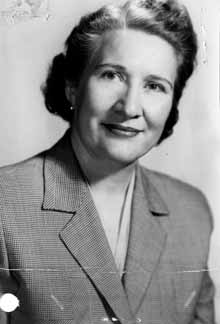 Faye LaVerne Bumpass graduated Lubbock High School as valedictorian in 1927 and received her bachelor’s degree in 1932 and her
master’s degree in 1934, both from Texas Technological College. Between the years of 1932-1941 Faye taught Latin and Spanish
in Texas high schools and served as a visiting instructor in Spanish during the summer at Texas Tech. She extensively traveled
Latin America between the years of 1945-1951, working as a teacher of Latin and English as a second language in Lima, Peru.
In 1948, she completed her Doctor of Letters degree from San Marcos University.
Faye LaVerne Bumpass graduated Lubbock High School as valedictorian in 1927 and received her bachelor’s degree in 1932 and her
master’s degree in 1934, both from Texas Technological College. Between the years of 1932-1941 Faye taught Latin and Spanish
in Texas high schools and served as a visiting instructor in Spanish during the summer at Texas Tech. She extensively traveled
Latin America between the years of 1945-1951, working as a teacher of Latin and English as a second language in Lima, Peru.
In 1948, she completed her Doctor of Letters degree from San Marcos University.
Beginning in 1957, Faye served as an assistant professor in both English and Foreign Languages. Her broad teaching experience would come in handy as she wrote several textbooks on bilingual education. Her testimony before Congress in May of 1967 on bilingual education was the only one selected for publication in the Congressional Record proceedings (Vol. 113 No. 81). In 1969, she became one of two women to acquire the high rank of Horn Professor, a rank previously only held by male professors. She continued to teach as a tenured faculty member at Texas Tech until 1974.
Related collections within the University Archives and the Southwest Collection holdings:
Faye LaVerne Bumpass Reference File
Faye Bumpass faculty file, 1941-1978
Homage to Faye LaVerne Bumpass. Third annual Gaye LaVerne Bumpass lecture papers.
Dept. of Classical and Romance Languages and
the Latin American Area Studies Program at Texas Tech University, 1981
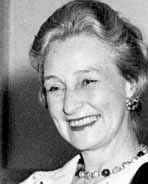 Born in Cleburne, Texas, Beatrix Aldrena Cobb received her Ph.D. from the University of Texas and worked with M.D. Anderson Hospital in Houston. In 1958, she joined the faculty of the psychology department at Texas Tech University. Cobb’s work with special problems in rehabilitation led to her promotion as Director of Research and Training in Mental Retardation. She wrote and edited textbooks on rehabilitation and royalties from two of those books, which were sold in the campus bookstore, were donated to a scholarship fund named after her. Some of her university related activities included being a sponsor for Mortar Board, serving on the 1971 Student Publications Committee and being named Faculty Woman of the Year in 1962 by the Association of Women Students. Cobb also holds the distinction of being one of the first two women to achieve the rank of Horn Professor, the highest academic rank of a professor at Texas Tech. She passed away in 1990.
Born in Cleburne, Texas, Beatrix Aldrena Cobb received her Ph.D. from the University of Texas and worked with M.D. Anderson Hospital in Houston. In 1958, she joined the faculty of the psychology department at Texas Tech University. Cobb’s work with special problems in rehabilitation led to her promotion as Director of Research and Training in Mental Retardation. She wrote and edited textbooks on rehabilitation and royalties from two of those books, which were sold in the campus bookstore, were donated to a scholarship fund named after her. Some of her university related activities included being a sponsor for Mortar Board, serving on the 1971 Student Publications Committee and being named Faculty Woman of the Year in 1962 by the Association of Women Students. Cobb also holds the distinction of being one of the first two women to achieve the rank of Horn Professor, the highest academic rank of a professor at Texas Tech. She passed away in 1990.
Related collections within the University Archives and the Southwest Collection holdings:
Beatrix Cobb Reference File
Beatrix A Cobb. et al. "Psychology at Texas Tech University: Legacy and Legend, a Chronicle of the Origin and
Development of the Department of Psychology, 1925-1987," Texas Tech Press, 1988
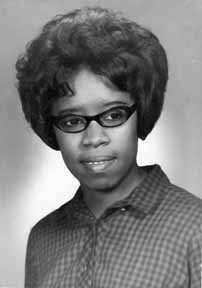 Stella Ruth Crockett Courtney was born on October 14, 1943, in Lubbock, Texas, and attended Dunbar High School where she was a member of the band. In the summer of 1961, after learning that Texas Tech would integrate, Stella was among a very small group of African Americans who decided to attend Texas Tech and together they formed a kind of support system for each other. Having turned down a band scholarship elsewhere Stella continued her musical training by joining the Texas Tech marching band, then lead by Dean Killion.
Stella Ruth Crockett Courtney was born on October 14, 1943, in Lubbock, Texas, and attended Dunbar High School where she was a member of the band. In the summer of 1961, after learning that Texas Tech would integrate, Stella was among a very small group of African Americans who decided to attend Texas Tech and together they formed a kind of support system for each other. Having turned down a band scholarship elsewhere Stella continued her musical training by joining the Texas Tech marching band, then lead by Dean Killion.
It was not an easy task to be among the first to break a long held barrier. Stella had to enroll in another section of a class because the first instructor used disparaging language toward her. Support from her family, church and community helped her stay on course and she pointed to her mother’s encouraging words of “sticking it out” as a motivator. “It’s my right to be here. I deserve an education and I’m going to get it,” she recalled in her March 3, 2010 oral history interview.
Influenced by strong mentors Stella knew from the 2nd grade she wanted to be a teacher. In May of 1965 she earned her bachelor’s degree in Elementary Education and thus became the first African American to attend Lubbock schools from K-12, attend all undergraduate years at Texas Tech and successfully graduate. Crockett retired in June of 2009 after 43 years of teaching.
One story shared about the band's integration years appears in the book Remember When? A History of African Americans in Lubbock, Texas. "...We were to march in the Cotton Bowl for the game and spend the night," recalled Stella's band mate Jean Nichols. "The only problem was that the Cotton Bowl had some rule about blacks on its playing field. None of the band members thought much about it until we were told that our black members could not march. As a drum section we informed Mr. Killion that if our black drummers could not go and march then we all would stay home… This was not done to make a statement but truly out of friendship and respect. As a group (the entire band) and especially the drum section, we made sure there were no back doors and no eating in the kitchen. Where we went our friends went." Dean Killion, then Band Director, made sure that his entire band was able to perform together.
Related collections within the University Archives and the Southwest Collection holdings:
Stella Courtney Crockett oral history interview [sound recording], 2010
Stella Courtney Crockett oral history interview [sound recording], 2014
See also:
Kristen Barton,
Diversity Exhibit Highlights First Black Woman to Graduate in Four Years From Texas Tech.
Texas Tech Today, February 7, 2017
Michael Cantu,
Defining Decades: Courtney Speaks on Experiences as First Black Tech Graduate
Daily Toreador, February 8, 2017
Amanda Castro-Crist,
Texas Tech African-American History: Stella Courtney Crockett, Texas Tech Today, February 12, 2019
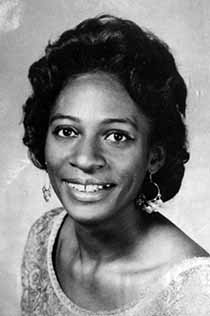 Vivian Imogene Davis was born on June 16, 1933 in Indianapolis, Indiana. She earned a bachelor’s degree from Ball State University in 1954 and a master’s degree in English Education from the University of Chicago in 1969. With a background in teaching English and Spanish at the high school and undergraduate level, as well as work experience in social work, Davis was hired as an assistant professor of English by Texas Technological College in February of 1972, making her the first female African American faculty member hired at the college as well as the second official African American faculty member hired (her husband, Dr. Emory Grant Davis, also hired in 1972, being the first). She acquired a doctoral degree from Northwestern University in June of 1973.
Vivian Imogene Davis was born on June 16, 1933 in Indianapolis, Indiana. She earned a bachelor’s degree from Ball State University in 1954 and a master’s degree in English Education from the University of Chicago in 1969. With a background in teaching English and Spanish at the high school and undergraduate level, as well as work experience in social work, Davis was hired as an assistant professor of English by Texas Technological College in February of 1972, making her the first female African American faculty member hired at the college as well as the second official African American faculty member hired (her husband, Dr. Emory Grant Davis, also hired in 1972, being the first). She acquired a doctoral degree from Northwestern University in June of 1973.
During her time at Texas Tech, Davis was a co-sponsor of the Student Organization for Black Unity at Texas Tech and actively shared her interest in teaching Black Literature to the campus and local community, serving as editor of the English Department’s Southwest Multi-Ethnic Newsletter and director of the Ethnic Studies program. Both she and her husband left Texas Tech in 1977 to accept teaching appointments at Bishop College in Dallas, Texas.
Dr. Davis continued to be active in the National Association for the Advancement of Colored People (NAACP), was chair of the Conference on College Composition and Communication in 1978, and served in several capacities in the National Council of Teachers in English (NCTE), including being heavily involved in the redirection and growth of the Black Caucus, serving as a member of the Advisory Board for its publication, College English, and holding several officer roles such as secretary in 1972-1973 and president in 1978-1980. More than two decades of service to NCTE resulted in her being awarded their Distinguished Service Award in 1994. In the early 1990s, she taught at Eastfield College in Mesquite, Texas for a decade, where a textbook scholarship continues to bear her name. Dr. Davis passed away on August 11, 2017.
Related collections within the University Archives and the Southwest Collection holdings:
Vivian Imogene Davis faculty file, 1972-2019
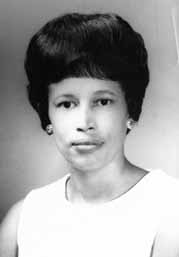 Hortense Williams Dixon holds the distinction of being the first African American to graduate from Texas Tech
with a doctorate degree. The chairman for her doctoral advisory committee, Dr. Berlie J. Fallon, described her academic work as being outstanding.
"Her defense of the doctoral dissertation was one of the most masterful I have ever attended in my fifteen years at Texas Tech."
Hortense Williams Dixon holds the distinction of being the first African American to graduate from Texas Tech
with a doctorate degree. The chairman for her doctoral advisory committee, Dr. Berlie J. Fallon, described her academic work as being outstanding.
"Her defense of the doctoral dissertation was one of the most masterful I have ever attended in my fifteen years at Texas Tech."
She was born on January 29, 1926, in Houston, Texas. Dixon attended several universities to acquire the appropriate degrees in higher education. She received her B.S. degree from Prairie View State College in 1946, a M.S. degree in 1949 from the University of Minnesota, and a Ed.D. degree from Texas Tech in 1970. Her degrees were in the area of education with a minor in home economics. While pursuing her studies she also held several academic positions, including Director of the Home Management Residence at Bishop College, Assistant Professor of Home Economics Education at Texas Southern University, and Part-time Instructor in Home Economics Education at Texas Tech University. After graduating from Texas Tech, Dixon returned to Houston to continue serving as an Associate Professor in home economics at Texas Southern University.
Related collections within the University Archives and the Southwest Collection holdings:
Hortense Williams Dixon Collection, 1970
See also:
Hortense Selena Williams Dixon, 1926-1988
(links to her biography on the Handbook of Texas website)
Amanda Castro-Crist,
Texas Tech African-American History: Hortense Selena Williams Dixon, Texas Tech Today, February 21, 2019
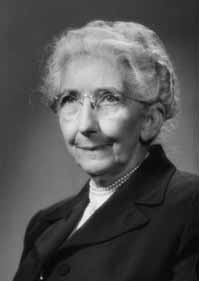 Mary Woodward Doak was born on February 15, 1877, on the Bar Bona Ranch in Live Oak County, Texas.
She received her B.A. in English and government from the University of Texas in 1925 and her M.A. in English and
sociology in 1929 from Texas Technological College, where from 1925-1945 Doak served as Dean of Women and a professor
in the English Department. She continued to teach in English from 1945-1949 until her retirement in 1950.
Mary Woodward Doak was born on February 15, 1877, on the Bar Bona Ranch in Live Oak County, Texas.
She received her B.A. in English and government from the University of Texas in 1925 and her M.A. in English and
sociology in 1929 from Texas Technological College, where from 1925-1945 Doak served as Dean of Women and a professor
in the English Department. She continued to teach in English from 1945-1949 until her retirement in 1950.
During her tenure she was very active in promoting women’s education. She organized the Tech chapter of the Association of Women Students in 1929, and worked to establish the Council of Women Graduates in 1927 which helped the Lubbock chapter of the American Association of University Women become officially affiliated with the national association in 1949. The Forum, an honorary service organization for senior female students was established in 1937 largely due to her efforts. In cooperation with Margaret Weeks, Dean of Home Economics, she inaugurated the Women’s Recognition Service in 1932 which continued until 1947 with sponsorship from the Quarterly Club and the Association of Women Students. The first women’s dormitory on the Texas Tech campus, built in 1934, continues to bears her name. Additionally, a scholarship was set up under her name by the Lubbock chapter of Delta Kappa Gamma.
Related collections within the University Archives and the Southwest Collection holdings:
Mary Woodward Doak Reference File
Mary Woodward Doak faculty file, 1933-1952
Warren P. Clement oral history interview [sound recording], 1981
Virginia Black Landwer oral history interview [sound recording], 1982
Mrs. George Langford oral history interview [sound recording], 1973
Margaret Woodward Weeks Papers, 1925-1967
Susan Wesendonk oral history interview [sound recording], 1975
See also:
Ruth Horn Andrews, The First Thirty Years: A History of Texas Technological College, 1925-1955
Glenys Young, Campus Buildings Honor Legacies of Women,
Texas Tech Today, March 24, 2016
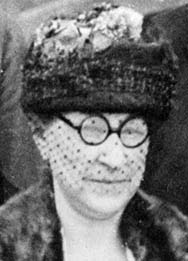 Born on January 13, 1864, Florence Adelia Bingham Drane grew up in Wilmington, Ohio. After attending business college in Oswego, New York, she relocated to Corsicana, Texas for a job opportunity. It was here that she met and married businessman Frank Neal Drane in 1885. Thereafter, she primarily went by her married name, Mrs. F. N. Drane. In the early years of the marriage, Florence devoted her energies to being a full-time wife and a mother to Hugh and Dorothy. As the children grew older, Florence, a minister’s daughter, increased her participation in community activities, particularly in church and club groups. During World War I, she served in volunteer roles such as county chairman of war savings and member of the County Council of Defense.
Born on January 13, 1864, Florence Adelia Bingham Drane grew up in Wilmington, Ohio. After attending business college in Oswego, New York, she relocated to Corsicana, Texas for a job opportunity. It was here that she met and married businessman Frank Neal Drane in 1885. Thereafter, she primarily went by her married name, Mrs. F. N. Drane. In the early years of the marriage, Florence devoted her energies to being a full-time wife and a mother to Hugh and Dorothy. As the children grew older, Florence, a minister’s daughter, increased her participation in community activities, particularly in church and club groups. During World War I, she served in volunteer roles such as county chairman of war savings and member of the County Council of Defense.
With the 1923 passing of Senate Bill No. 103, the charter for the creation of Texas Technological College, Florence was vocal about her desire to contribute to the founding of the new school that would be co-education from the start. Her husband’s prominence as a successful West Texas businessman gave her access to Texas Governor Pat Neff, who appointed her as one of two women on the school’s first Board of Directors. She expressed her excitement for the project in a 1924 letter to Dr. Paul Whitfield Horn, the school’s first president, stating “It is impossible for me to tell you how very deeply interested I am in the College… I am giving the best I have to it, and will until it stands a living monument to the greatness of Texas.”
Drane served as a board member for nine straight years. She is cited in a January (1931?) Texas Tech press release as being the first woman in Texas to hold the position of vice-chairman on a Texas university board of directors. The unexpected death of President Horn on April 13, 1932, led to the Board appointing Drane interim president on May 6th, thus making Florence not only the first woman to serve in the role of Texas Tech president but also, according to Board chairman Clifford B. Jones, making her the first woman in the history of American higher education to act as head of a large, state-owned co-educational institution. As president, Florence signed all the diplomas for the June 1932 graduates.
Sadly, two month after her appointment, Florence passed away suddenly on July 11, 1932, at the age of 68. Her remarkable business acumen and faithful dedication to the university’s development and growth was recognized by the Board on August 31, 1946, with the renaming of Women’s Dormitory No. 2, which opened in the fall of 1941, as F. N. Drane Hall. As of 2022, it is one of only four buildings on the Texas Tech Lubbock campus named solely in honor of a woman.
See also:
Glenys Young, Campus Buildings Honor Legacies of Women, Texas Tech Today, March 24, 2016 (see pages 142-152 of the March 2016 Texas Tech Press Releases)
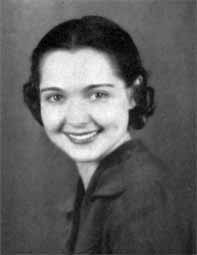 Born on July 5, 1917, in Lockney, Texas, Maxine Fry was a noted beauty who enrolled in Texas
Tech in 1934 to study journalism. An active participant in campus life Fry was a member of The Forum (later renamed
Mortar Board), President of the Las Chaparitas sorority (later renamed Kappa Kappa Gamma), an occasional reporter for
the Toreador newspaper, and winner of several school beauty contests including being named a 1938 Sun Bowl Princess. In
May of 1937 she became the first elected female president of the Student Council, an achievement that neither UT nor
Texas A&M’s female students could reach until 1975 and 1994.
Born on July 5, 1917, in Lockney, Texas, Maxine Fry was a noted beauty who enrolled in Texas
Tech in 1934 to study journalism. An active participant in campus life Fry was a member of The Forum (later renamed
Mortar Board), President of the Las Chaparitas sorority (later renamed Kappa Kappa Gamma), an occasional reporter for
the Toreador newspaper, and winner of several school beauty contests including being named a 1938 Sun Bowl Princess. In
May of 1937 she became the first elected female president of the Student Council, an achievement that neither UT nor
Texas A&M’s female students could reach until 1975 and 1994.
Under her leadership, and with the help of classmate Arch Lamb and the Saddle Tramps, Fry was able to successfully reinstate the school’s bonfire tradition. They had been banned by school administrators following outrage by Lubbock citizens over vandalism and theft of wood by Tech students. Her administration also wrote a revision of the Student Council’s constitution. After graduation she married Hugh McCullough, who had been her Vice-President when she was student body President, and the couple had two children during their 50 plus year union. Fry went on to teach journalism for two years in Littlefield and Grandfalls, worked on The Midlander Magazine its first seven years in publication, and was a charter member of the Midland Symphony Guild.
Related collections within the University Archives and the Southwest Collection holdings:
Maxine Fry Scrapbook, 1937-1940
See also:
Shelby Chapman, “Maxine Fry McCullough: In Memorium,” College of Media and Communications, August 2005
Lori Cortez, "
Maxine Fry McCullough: Texas Tech’s First Woman SGA President," Texas Tech Today, 2012
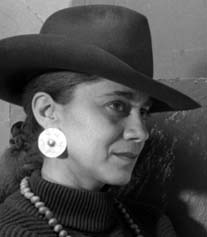 Born in 1949 in San Angelo, Texas, Tina Fuentes knew from a young age that art was her calling. She, accordingly, channeled her passion, strength, and understanding of the fundamentals of composition, perspective, and color into a becoming a nationally recognized multi-media artist. She earned a B.F.A. degree in 1973 and an M.F.A. degree in 1975 from North Texas State University. Tina specializes in the areas of painting, drawing and printmaking. Since 1982, her work has been featured in a large number of one-woman and multi-artist exhibitions, as well as a documentary film, El Arte de Tina Fuentes, that was broadcast on PBS.
Born in 1949 in San Angelo, Texas, Tina Fuentes knew from a young age that art was her calling. She, accordingly, channeled her passion, strength, and understanding of the fundamentals of composition, perspective, and color into a becoming a nationally recognized multi-media artist. She earned a B.F.A. degree in 1973 and an M.F.A. degree in 1975 from North Texas State University. Tina specializes in the areas of painting, drawing and printmaking. Since 1982, her work has been featured in a large number of one-woman and multi-artist exhibitions, as well as a documentary film, El Arte de Tina Fuentes, that was broadcast on PBS.
Her versatility and driven mentality has resulted in her being selected as an exhibition juror and being appointed to several arts organization boards and programs. She has received several artist-in-residence awards, faculty awards, and research grants, with the most recent being a sizable National Science Foundation collaborative grant with Atmospheric Science Professor Eric Bruning. Tina also shares her love of art with students through a long and productive teaching career that began in 1972 in the Abilene Independent School District and continues into 2017 at Texas Tech, where she is a tenured professor in the School of Art.
Related collections within the University Archives and the Southwest Collection holdings:
Tina Fuentes Reference File
Christina Fuentes Faculty File, 1986-2017
Tina Fuentes oral history interview [sound recording], 2001
Tina Fuentes oral history interview [sound recording], 2021
KTXT-TV Recordings, 1994-2008 – “El Art De Tina Fuentes” video (2000) and Tina Fuentes interviews (5 recordings), undated
University News and Publications Recordings, 1994-2008 – “Day of the Dead” interview, undated
See also:
Allison Boroda, “Transformations through Art and Science,” Ampersand, College of Visual and Performing Arts, Fall
and Winter, 2015: 5-9
Kippra D. Hopper and Laurie J. Churchill, Art of West Texas Women, Texas Tech University Press, 2010
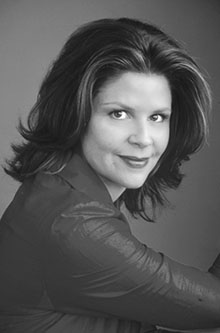 Susan Graham was raised in Midland, Texas. In the early 1980s, she attended Texas Tech University, during which time
she participated in student opera productions such as Der Rosenkavalier prior to receiving a bachelor of fine arts in
music performance degree in May of 1983. Her career as a rising star in the opera world began with winning the New York
Metropolitan Opera’s National Council Auditions in 1988, and she made her international début in 1994 at Covent Garden
playing Massenet's Chérubin.
Susan Graham was raised in Midland, Texas. In the early 1980s, she attended Texas Tech University, during which time
she participated in student opera productions such as Der Rosenkavalier prior to receiving a bachelor of fine arts in
music performance degree in May of 1983. Her career as a rising star in the opera world began with winning the New York
Metropolitan Opera’s National Council Auditions in 1988, and she made her international début in 1994 at Covent Garden
playing Massenet's Chérubin.
In the course of her 30-plus year career as a noted Mezzo-soprano, Graham has performed in a variety of famous musical stages across the globe, including La Scala Milan, the Sydney Opera House, Paris’s Théâtre du Châtelet, Vienna State Opera, the San Francisco Opera, Carnegie Hall, the Santa Fe Opera, and the Salzburg Festival. She has performed regularly with various well known symphonies such as the Boston Symphony, the London Symphony Orchestra, the New York Philharmonic, and Orchestre de Paris.
Numerous accolades have been bestowed on Graham over the years, include being a recipient of the Schwabacher Award from the Merola Program of San Francisco Opera, winning a Career Grant from the Richard Tucker Foundation, being named Musical America's Vocalist of the Year in 2004, being awarded the Chevalier of the Order of Arts and Letters by the French government, and appointment as a U.S. delegate for UNESCO. She was praised by Gramophone magazine as “America's favorite mezzo,” and a 2018 New York Times profile on her prolific vocal career described in her as “Opera’s Sweetheart.” Graham performed at George W. Bush's second inauguration in 2005 and Senator Edward Kennedy’s funeral mass. In 2006, her home town of Midland declared September 5th as “Susan Graham Day.” In 2019, Graham was the guest speaker for the May 17th Texas Tech commencement ceremonies and was inducted into the West Texas Walk of Fame that September.
Related collections within the Southwest Collection holdings:
Susan Graham Papers, 1968-2017
John Gillas Collection, 1971-2015
See also:
Chester Rosson, “Susan Graham,” Texas Monthly, April 2004
“Susan Graham (Mezzo-soprano)” at https://www.bach-cantatas.com/Bio/Graham-Susan.htm
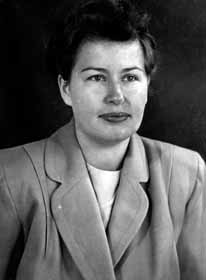 Edna Maynard Gott was born on March 19, 1920, in Chandler, Texas. After receiving her B.S. degree in
Economics from the University of Texas in 1942 and her M.S. degree from Texas Technological College in 1954, she began her
teaching career as an instructor in Economics at Texas Technological College. For more than a decade she battled with the
department and university administration for equality in teaching rank, promotion and tenure. In the spring of 1973 she
was promoted to the rank of Assistant Professor. Nine years later, Gott became the first women to achieve tenure in the
Department of Economics.
Edna Maynard Gott was born on March 19, 1920, in Chandler, Texas. After receiving her B.S. degree in
Economics from the University of Texas in 1942 and her M.S. degree from Texas Technological College in 1954, she began her
teaching career as an instructor in Economics at Texas Technological College. For more than a decade she battled with the
department and university administration for equality in teaching rank, promotion and tenure. In the spring of 1973 she
was promoted to the rank of Assistant Professor. Nine years later, Gott became the first women to achieve tenure in the
Department of Economics.
Her work focused on the economic status and challenges facing women and minorities. To advance the cause for women’s rights she unmasked the inequities towards female faculty in academia and was the coordinator of the Lubbock Chapter of the National Organization of Women. Gott was also an active member of the International Center for Arid and Semi-Arid Land Studies where she served on the Women in Development committee and was a founding member of the Women’s Study Program.
Gott was involved with a variety of academic and professional organizations, serving on several boards. She was the faculty advisor to Phi Gamma Nu and four-term Vice-President of the American Association of University Professors. In 1983 she received the Outstanding Teaching Award by Mortar Board and Omicron Delta Kappa. Edna Maynard Gott passed away in 1986. Her legacy lives on through the Florence Brown En Avant Club Scholarship and the Edna Maynard Scott Memorial Library.
Related collections within the University Archives and the Southwest Collection holdings:
Edna Maynard Gott Reference File
Susie Edna Maynard Gott faculty file, 1951-1986
Edna Maynard Gott Papers, 1960-1986
Edna Maynard Gott and Preston Frazier Gott Papers, undated
National Organization for Women, Lubbock Chapter, Records, 1967-1978
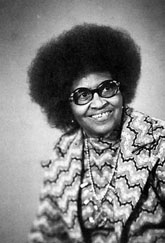 Lucille S. Graves is noted in her
oral history interview, conducted in 1974 by the Southwest Collection/Special Collections Library, as being the first African American student at Texas Tech. She came to Tech with a bachelor’s degree and was working on her master’s degree in the summer of 1961. It was Mrs. Graves’ persistent petitioning for entrance into the college that paved the way forother African Americans to attend Texas Tech.
Lucille S. Graves is noted in her
oral history interview, conducted in 1974 by the Southwest Collection/Special Collections Library, as being the first African American student at Texas Tech. She came to Tech with a bachelor’s degree and was working on her master’s degree in the summer of 1961. It was Mrs. Graves’ persistent petitioning for entrance into the college that paved the way forother African Americans to attend Texas Tech.
Her 10 minute interview discusses how, when repeatedly refused entrance into the college on the grounds that the its charter, Senate Bill No. 103, specifically outlines that Texas Tech is a college for white students, she in turn sought the help of the NAACP. Robert Cabiness Goodwin, President of Texas Tech, was contacted by the NAACP and was told a lawsuit would be filed if Texas Tech did not allow Mrs. Graves to attend.
Mrs. Graves shared her excitement at getting a call from Texas Tech President Goodwin, who told her that if she could get to the college within 15 minutes before registration shut down she would be able to enroll. She was so nervous she had to get a neighbor to drive her and, despite forgetting her transcripts, she did indeed make it to the college to enroll within the time limit.
Her quiet enrollment led to a peaceful, non-violent integration of the traditionally white college. In her oral history interview, Mrs. Graves harbored no ill-will toward the college nor its administration against their initial refusals to allow her attend. Her determination to gain the additional education she so desperately wanted shines through and perhaps it was because of this and her strength of character that she was able to achieve her goals in life.
The book, Remember When?: A History of African Americans in Lubbock, Texas, provides a biography of trail blazer Lucille Sugar Graves. Besides breaking the race barrier at Texas Tech, Mrs. Graves was also the founder of Mary and Mac, the first black private school in Lubbock, Texas, on September 17, 1955. She chose the name of her school after the children’s nursery rhyme on the reasoning that “This poem depicts the act of boys and girls in their desire to become useful in this society.” Eventually, Graves earned her doctoral degree from the University of Houston. She also continued to serve as administrator of the Mary and Mac Private School until retiring in 1991.
In a brief article in the February 25, 1982 issue of the Lubbock Digest (p. 10), Dr. Graves recalled the discrimination she faced in the classroom as the first African American to take classes at Texas Tech. She also stated that, despite two decades passing, the situation for African Americans at the university had not improved for the better, other than maybe for athletes, nor were prospects for the students following graduation much better.
Related collections within the University Archives and the Southwest Collection:
Lucille Graves oral history interview [sound recording], 1974.
Thelma Robinson and Katie Parks, “Schools” in Remember When?: A History of African Americans in Lubbock, Texas.
Lubbock: PrinTech, Texas Tech University, 1999: p. 101-108.
Phil Price, Equal Opportunity Hero: T.J. Patterson's Service to West Texas. Lubbock: Texas Tech University Press,
2017: p. 60-61. Lubbock: PrinTech, Texas Tech University, 1999: p. 101-108.
See also:
Lucille Sugar Barton Graves bio from the Handbook of Texas
Amanda Castro-Crist,
Texas Tech African-American History: Lucille S. Graves, Texas Tech Today, February 5, 2019
Commission to recognize East Lubbock's historical Mary and Mac School from the Lubbock Avalanche-Journal,
July 10, 2014
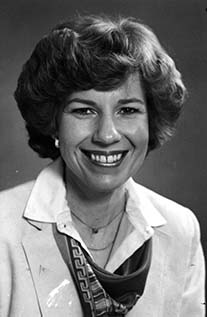 After receiving a bachelor’s degree in home economics from Louisiana Tech University in 1966, Elizabeth G. “Bess” Haley attended Florida State University, from which she received a master’s degree in clothing and textiles (1968) and a doctoral degree in child development (1972). Prior to coming to Texas Tech, she served as the dean of home economics at Louisiana Tech University for sixteen years.
After receiving a bachelor’s degree in home economics from Louisiana Tech University in 1966, Elizabeth G. “Bess” Haley attended Florida State University, from which she received a master’s degree in clothing and textiles (1968) and a doctoral degree in child development (1972). Prior to coming to Texas Tech, she served as the dean of home economics at Louisiana Tech University for sixteen years.
The selection of Haley in 1981 as incoming dean marked a new era of revitalization for the College of Home Economics. Under her leadership, the college was renamed Human Sciences, student enrollment and faculty research increased, and programs were established for Restaurant, Hotel and Institutional Management (RHIM), family financial planning, and substance abuse studies. Notable increases in student scholarships, college endowments and alumni relations during the 1980s-1990s are also attributed to Haley.
In 1988, Haley became the first woman to take over full presidential administrative duties who also had the full academic credentials for such a high-level university position. When asked about being the first woman to cross that barrier, she replied, “I feel it is important for women faculty members and women students at Texas Tech. But I feel both men and women can serve effectively in a wide variety of jobs.” (Jim Barlow and Pat Graves, “Tech Regents Name Haley to Post: Home Economics Dean Selected as Interim President,” Lubbock Avalanche-Journal, November 14, 1988)
She has served as president of both the National Council of Administrators of Home Economics and the American Home Economics Association, which selected her as one of the nation’s top ten “Home Economics to Watch” in 1985. A student scholarship at Texas Tech is named in Haley’s honor. As of 2018, Haley is the only woman at Texas Tech to serve as a professor, a dean, an interim-president, and a deputy chancellor for operations.
Related collections within the University Archives and the Southwest Collection holdings:
Elizabeth G. Haley Reference File
Elizabeth G. Haley faculty file, 1981-1990
Elizabeth G. Haley oral history interview [sound recording], 2019
Elizabeth G. Haley oral history interview [sound recording conducted for Mortar Board], 2001
Donald Haragan oral history interview [sound recording], 2011
Gail Barbara House oral history interview [sound recording], 2015
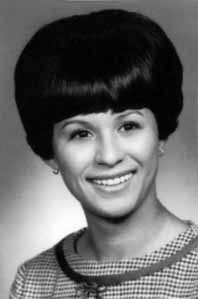 Anita Carmona Harrison was born on February 17, 1944, in the Guadalupe neighborhood of Lubbock, Texas.
Following a tour of the Texas Tech campus with her second grade teacher, Mrs. Billie Everton, young Anita decided she wanted to
attend and started a piggy bank fund. In the fall of 1963 she enrolled at Texas Tech, where she worked in the library, tutored
geology students and made the Dean’s List. Of her college years she fondly recalls “meeting people from diverse backgrounds,”
hanging out with friends in the SUB, and being taught once again by Dr. Everton, who had by now become a professor at
Texas Tech.
Anita Carmona Harrison was born on February 17, 1944, in the Guadalupe neighborhood of Lubbock, Texas.
Following a tour of the Texas Tech campus with her second grade teacher, Mrs. Billie Everton, young Anita decided she wanted to
attend and started a piggy bank fund. In the fall of 1963 she enrolled at Texas Tech, where she worked in the library, tutored
geology students and made the Dean’s List. Of her college years she fondly recalls “meeting people from diverse backgrounds,”
hanging out with friends in the SUB, and being taught once again by Dr. Everton, who had by now become a professor at
Texas Tech.
In 1967 she graduated with a Bachelor of Science degree in Elementary Education, went on to teach bilingual kindergarten classes and, in 1969, helped develop Lubbock ISD’s first Curriculum Guide for Bilingual Kindergarten. She continued to teach elementary school while raising two daughters and, in 1999, she retired from LISD after almost 30 years from public teaching.
Anita is recognized as the first Lubbock-born Latina to attend Lubbock schools from K-12, attend all undergraduate years at Texas Tech and successfully graduate. She grew up in a very tight knit family and has proudly shared stories of her childhood, family and community over the years with the Lubbock Avalanche-Journal and Latino Lubbock magazine. She continued to contribute to her community through volunteer work at Covenant SurgiCenter, Hope House, and serving on the city’s library board.
Related collections within the University Archives and the Southwest Collection holdings:
Anita Carmona Harrison short self-biography from “First Texas Tech Los Tertulianos Hispanic
Alumni Reunion” booklet, November 13-14, 2009
Anita Carmona Harrison oral history interview [sound recording], 2009
See also:
Anita Carmona Harrison, “Anita’s barrio memories: my college graduation.” Latino Lubbock, June 2008
Ray Westbrook, “LISD teacher the first local Hispanic to attend only Lubbock schools.” Lubbock Avalanche-Journal,
February 1, 2010
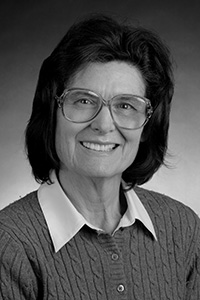 After receiving her B.A. from the University of California, Berkeley in 1968, and her M.A. from the University of Kansas in 1972, both in Anthropology, Eileen Johnson came to Texas Tech to pursue her doctorate in Biological Sciences. She was soon appointed the field supervisor of the Lubbock Lake Landmark and later began teaching in the Museum Science
program.
After receiving her B.A. from the University of California, Berkeley in 1968, and her M.A. from the University of Kansas in 1972, both in Anthropology, Eileen Johnson came to Texas Tech to pursue her doctorate in Biological Sciences. She was soon appointed the field supervisor of the Lubbock Lake Landmark and later began teaching in the Museum Science
program.
Throughout her long career at Tech, Dr. Johnson has held various positions. She was promoted to full professor in 1992 and, in 2007, was designated as a Horn Professor in recognition of her national prominence as respected scholar. Organizations such as the National Geographic Society, the National Science Foundation, and the Texas Historical Commission have noted her significant contributions to the field. In 1984, the West Texas Museum Association gave her an Action Award for her significant contributions to Southern High Plains culture. Mountain-Plains Museums Association, in 2016, bestowed upon her with the Hugo G. Rodeck Award for Excellence, its most prestigious award honoring an individual’s service to the museum profession.
Dr. Johnson currently serves as the Director of Lubbock Lake Landmark, a Smithsonian Institute honored archeological site, and as the chairwoman of the Heritage and Museum Sciences program. She was a past director of the Museum of Texas Tech University.
Related collections within the University Archives and the Southwest Collection holdings:
Eileen Johnson Reference File
Eileen Georgina Johnson Faculty File, 1972-1991
Research Services Records, 1964-1988 and undated – Eileen Johnson Project files, 1976-1980
Robert Baker Papers, 1949-2015 and undated – Eileen Johnson, 1979-1987 and undated
Tony R. Mollhagen Papers, 1835-2000 – Literary Production: Johnson, Eileen, 1983
University News and Publications Records, 1955-2004 – Eileen Johnson, 1972-1991
See also:
Amanda Castro-Crist, “A Lifetime of Service:
Eileen Johnson,” Texas Tech Today, April 12, 2018
Mary Beth Holm,
“Eileen Johnson Celebrates 45 Years at Texas Tech,” The Daily Toreador, April 18, 2018
William Kerns, “Johnson Brings Passion for Museums to Leadership Role at Tech,” Lubbock Avalanche-Journal, June 10, 2011
Heidi Toth, Museum of Texas Tech Students, Faculty
Win Big at Conference, Texas Tech Today, November 17, 2016
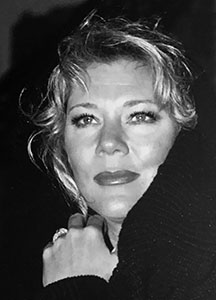 Hailing from Pampa, Texas, Mary Jane Johnson graduated with a bachelor’s degree in music in
1972 from Texas Tech University, where she was recognized as a standout vocalist, and then received her master’s degree
in performance from West Texas State University. Selected by famed opera star Luciano Pavarotti as one of 16 winners
in the inaugural Luciano Pavarotti/Opera Company of Philadelphia International Voice Competition in 1981, Johnson soon
found herself performing on the international stage in acclaimed roles that would eventually take her across five
continents. In her first televised opera, she appeared as Musetta in an Emmy-winning PBS production of La Boheme,
alongside Pavarotti. The two would later perform together in a live broadcast of the Pavarotti Plus Gala from Lincoln
Center.
Hailing from Pampa, Texas, Mary Jane Johnson graduated with a bachelor’s degree in music in
1972 from Texas Tech University, where she was recognized as a standout vocalist, and then received her master’s degree
in performance from West Texas State University. Selected by famed opera star Luciano Pavarotti as one of 16 winners
in the inaugural Luciano Pavarotti/Opera Company of Philadelphia International Voice Competition in 1981, Johnson soon
found herself performing on the international stage in acclaimed roles that would eventually take her across five
continents. In her first televised opera, she appeared as Musetta in an Emmy-winning PBS production of La Boheme,
alongside Pavarotti. The two would later perform together in a live broadcast of the Pavarotti Plus Gala from Lincoln
Center.
Noted for her “dramatic soprano repertoire,” Johnson has performed at some of the most prestigious music organizations in the world, including the Metropolitan Opera, the Prague Opera House and Prague Festival, Opera Bastille, Teatro Municipal de Santiago, the San Francisco Opera, the Montreal Opera, and Carnegie Hall. She has held Artist in Residence positions with the Texas Tech School of Music (1997-1998) and the Santa Fe Opera. Johnson co-founded the Taos Opera Institute and served as its artistic director for several years. Additionally, she has held vocal teaching positions with McMurray University, the American Institute of Musical Studies in Graz, Austria, and, beginning in 2000, was a member of the faculty of Amarillo College.
Related collections within the University Archives and the Southwest Collection holdings:
Mary Jane Johnson Reference File
Mary Jane Johnson Scrapbooks, 1966-1983 [1 microfilm reel]
Mary Jane Johnson Papers, 1998-1999
Gene Kenney oral history interview [sound recording], 2000
 Ginger Kerrick was born on November 28, 1969, in El Paso, Texas, and spent her youth there dreaming of a future career
in space and athletics. A knee injury early in her college years led her to focus full-time on her science education.
She transferred to Texas Tech with the help of scholarships and student job opportunities procured by Dr. Walter Borst
of the Physics Department. From Texas Tech Ginger earned her bachelor’s of science degree in 1991 and her master’s of
science degree in 1993, both in the field of physics. An internship with the Johnson Space Center got her foot in the door.
Her dogged determination to gain full-time employment with NASA proved successful, despite a hiring freeze and disqualification
from the astronaut interview process due to a health issue. Employed for over two decades with NASA, Ginger has held multiple
positions, most notably being selected as the first non-astronaut capsule communicator in 2001 and as a flight director
in 2005, making her the first Hispanic female to hold that position. Ginger continued her association with Texas Tech
through teaching in the STEM-MBA program in the Rawls College of Business and as a guest speaker in Kent Hance’s
senior seminar course. She was also the TTU commencement speaker in December 2010.
Ginger Kerrick was born on November 28, 1969, in El Paso, Texas, and spent her youth there dreaming of a future career
in space and athletics. A knee injury early in her college years led her to focus full-time on her science education.
She transferred to Texas Tech with the help of scholarships and student job opportunities procured by Dr. Walter Borst
of the Physics Department. From Texas Tech Ginger earned her bachelor’s of science degree in 1991 and her master’s of
science degree in 1993, both in the field of physics. An internship with the Johnson Space Center got her foot in the door.
Her dogged determination to gain full-time employment with NASA proved successful, despite a hiring freeze and disqualification
from the astronaut interview process due to a health issue. Employed for over two decades with NASA, Ginger has held multiple
positions, most notably being selected as the first non-astronaut capsule communicator in 2001 and as a flight director
in 2005, making her the first Hispanic female to hold that position. Ginger continued her association with Texas Tech
through teaching in the STEM-MBA program in the Rawls College of Business and as a guest speaker in Kent Hance’s
senior seminar course. She was also the TTU commencement speaker in December 2010.
The accolades continue to pour in for the former Texas Tech graduate. She received the Texas Executive Women’s 2011 Women on the Move award and in 2016 she was inducted into the Texas Women’s Hall of Fame in the area of STEM. Through her many speaking and teaching engagements Ginger serves as an inspiration to others dreaming of a career in space exploration and science. After 30 years of service, Kerrick retired from NASA in September 2021.
Related collections within the University Archives and the Southwest Collection holdings:
Ginger Kerrick Reference File
Ginger Kerrick oral history interview [sound recording], 2016
See also:
Emily Gardner,
NASA Flight Director Discusses Leadership at Women's Institute Luncheon. Texas Tech Today, March 27, 2015
John Davis,
Alumna Considers Space Career a
Mission Accomplished. Texas Tech Today, January 7, 2009
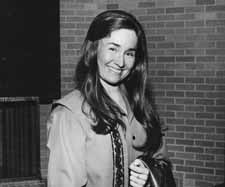 Anne Lynch grew up near Dell City on a cattle ranch in West Texas. As an Animal Science major,
she participated in Texas Tech’s Block and Bridle Club and Rodeo Club. While working in the horse barn of the Texas Tech Farm
Lynch became familiar with Happy V, then serving as the university’s animal mascot, and began riding him. By the end of her
junior year, Lynch auditioned for the role of the 13th Masked Rider, and, in 1974, became the first female chosen for
this honored position.
Anne Lynch grew up near Dell City on a cattle ranch in West Texas. As an Animal Science major,
she participated in Texas Tech’s Block and Bridle Club and Rodeo Club. While working in the horse barn of the Texas Tech Farm
Lynch became familiar with Happy V, then serving as the university’s animal mascot, and began riding him. By the end of her
junior year, Lynch auditioned for the role of the 13th Masked Rider, and, in 1974, became the first female chosen for
this honored position.
Although she grew up riding horses and was familiar with Happy V, her selection was met with skepticism. In the minds of some it was assumed that women did not have the strength to handle the reins. Lynch had to convince football coach Jim Carlin and Animal Science chair Dale Zinn that she could indeed ride. She proved capable, and received the mask and cape. Reaction to a female Masked Rider was mixed but, in the end, many supported Lynch. She had a successful year representing Texas Tech with dignity. Her proficiency in this role paved the way for future women to have the opportunity to try out for the Masked Rider. Anne Lynch Hanson graduated from Tech in 1975. She lives in Dell City and markets CL Ranch gypsum in Texas and New Mexico.
See also:
Melissa Griggs, “Anne Lynch feels a little nervous...” The University Daily, September 13, 1974
Leslie Cranford, “Anne Lynch Hansen didn’t
allow obstacles to keep her from being the first female Masked Rider,” Texas Tech Today, October 14, 2011
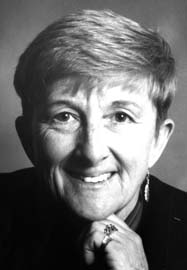 Jeannine McHaney is credited with establishing and growing the women’s athletic program at Texas Tech. She began her
career at the university in 1966 as an assistant professor in the Department of Health, Physical Education and Recreation.
That same year she was appointed the Women’s Intramural Director and given a measly annual budget of $500 to run the program,
which was able to exist due in part to the women’s coaches contributing their time for free. In addition, Jeannine served
as the volleyball and gymnastics coach. With the enactment of Title IX in 1975, Jeannine was appointed as the first Women’s
Athletic Director and, during her 10-year term in that role, she grappled with issues such an inadequate funding and poor
facilities for the women’s athletic teams. When the men’s and women’s athletic departments were combined in 1985 she was
appointed as an assistant athletics director and would later be promoted in 1991 to associate director of athletics.
Over the course of her 28 years with Texas Tech, Jeannine was heavily involved and influential in women’s athletics in both
the Southwest Conference and the NCAA. Among her many recognitions was being named the 1993 Administrator of the Year
by the Women’s Basketball Coaches Association.
Jeannine McHaney is credited with establishing and growing the women’s athletic program at Texas Tech. She began her
career at the university in 1966 as an assistant professor in the Department of Health, Physical Education and Recreation.
That same year she was appointed the Women’s Intramural Director and given a measly annual budget of $500 to run the program,
which was able to exist due in part to the women’s coaches contributing their time for free. In addition, Jeannine served
as the volleyball and gymnastics coach. With the enactment of Title IX in 1975, Jeannine was appointed as the first Women’s
Athletic Director and, during her 10-year term in that role, she grappled with issues such an inadequate funding and poor
facilities for the women’s athletic teams. When the men’s and women’s athletic departments were combined in 1985 she was
appointed as an assistant athletics director and would later be promoted in 1991 to associate director of athletics.
Over the course of her 28 years with Texas Tech, Jeannine was heavily involved and influential in women’s athletics in both
the Southwest Conference and the NCAA. Among her many recognitions was being named the 1993 Administrator of the Year
by the Women’s Basketball Coaches Association.
While she lost her battle with cancer in October of 1994, many reminders of the significant contributions Jeannine has made at Texas Tech remain. The High Riders spirit organization created an award in her name and there is also an endowed graduate scholarship named after her in the Department of Kinesiology and Sports Management.
In May of 2002 the Board of Regents approved naming part of the Hall of Honor section in west entrance area the United Spirit Arena as the Jeannine McHaney Hall of Honor (with the other half being named after Polk Robinson). A bronze sculpture of Jeannine was dedicated on January 17, 2004 and placed in the Hall of Honor. The plaque contains a quote by Lady Raider Noel Johnson following Tech’s 1993 NCAA tournament championship which states “Any success in the past or future of women’s athletics at Texas Tech is a result of Jeannine McHaney. Her courage and leadership will forever be embedded in Texas Tech athletics.” The National Association of Collegiate Women Athletics Administrators awarded McHaney posthumously in 2006 as a Lifetime Achievement Award recipient.
Related collections within the University Archives and the Southwest Collection holdings:
Jeannine McHaney Faculty File
Jeannine McHaney Reference File
See also:
Patrick Gonzales, “Pioneer in Tech Women's Sport Honored.” Lubbock Avalanche-Journal, January 18, 2004
Charles Griffin and Kippra D. Hopper, "In the Path of a Champion, Jeannine McHaney." Vistas, Summer/Fall 1994
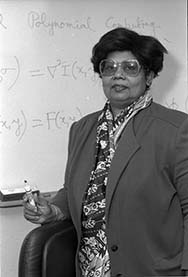 In 1969, Sunanda Mitra came to Texas Tech as the first official female graduate researcher in the
Department of Electrical Engineering, conducting research in the area of thermonuclear research in collaboration
with professors Magne Kristiansen and Marion O. Hagler. She received her master’s degree in physics from Calcutta
University in 1957 and her doctoral degree in Physics in 1966 from Marburg University. During her long tenure at
Texas Tech Dr. Mitra held various positions with Health Sciences Center, the Department of Electrical and Computer
Engineering, and, beginning in 1988, became the founder and Director of the Computer Vision and Image Analysis
Laboratory.
In 1969, Sunanda Mitra came to Texas Tech as the first official female graduate researcher in the
Department of Electrical Engineering, conducting research in the area of thermonuclear research in collaboration
with professors Magne Kristiansen and Marion O. Hagler. She received her master’s degree in physics from Calcutta
University in 1957 and her doctoral degree in Physics in 1966 from Marburg University. During her long tenure at
Texas Tech Dr. Mitra held various positions with Health Sciences Center, the Department of Electrical and Computer
Engineering, and, beginning in 1988, became the founder and Director of the Computer Vision and Image Analysis
Laboratory.
From 1998-2001, she served as Associate Editor for the Journal of Electronic Imaging and continued to conduct research in the areas of image processing, pattern recognition, medical imaging and compression. In 2005, Mitra achieved the double distinction of being the first woman in the field of engineering, as well as being the first Asian woman, to be prompted the high rank of Horn Professor at Texas Tech.
Related collections within the University Archives and the Southwest Collection holdings:
Sunanda Mitra faculty file, 1984-1991
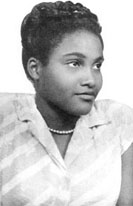 Ophelia Powell-Malone holds a place in Texas Tech history as the first African American to graduate with a
bachelor's degree. She transferred from Huston-Tillotson University in Austin, Texas, to attend Texas Tech shortly after
the college quietly integrated. A home economics major, Powell-Malone received her degree in 1964 and went on to become
a teacher in New Mexico. Later she worked as a dietitian at Langston University and in nursing homes in Lubbock and Houston.
Mentor Tech, a division of Institutional Diversity, Equity and Community Engagement, chose Powell-Malone as one of two
trailblazing individuals to honor in the naming of their program, which was established in 2002.
(photo courtesy of Mentor Tech)
Ophelia Powell-Malone holds a place in Texas Tech history as the first African American to graduate with a
bachelor's degree. She transferred from Huston-Tillotson University in Austin, Texas, to attend Texas Tech shortly after
the college quietly integrated. A home economics major, Powell-Malone received her degree in 1964 and went on to become
a teacher in New Mexico. Later she worked as a dietitian at Langston University and in nursing homes in Lubbock and Houston.
Mentor Tech, a division of Institutional Diversity, Equity and Community Engagement, chose Powell-Malone as one of two
trailblazing individuals to honor in the naming of their program, which was established in 2002.
(photo courtesy of Mentor Tech)
See also:
Mentor Tech bio on Ophelia Powell-Malone
Callie Jones,
Ophelia Powell-Malone paved the way for progress, Texas Tech Today, March 21, 2016
2014 marks 50th anniversary of first African-American Tech graduate,
Lubbock Avalanche-Journal, May 16, 2014
Amanda Castro-Crist,
Texas Tech African-American History: Ophelia Powell-Malone, Texas Tech Today, February 7, 2019
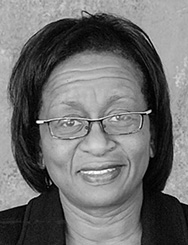 Growing up in segregated Dallas during the 1950s, Brenda J. Peters spent her early years helping out at her parents’ soul food restaurant. She was an avid reader who treasured the bi-weekly bookmobile visits to her Black neighborhood that had no library available nearby. Her high school years were challenging as she among the earliest group of African American students to attend a newly integrated, predominately white school. Entering Texas Tech in 1970, she once again found herself in the lonely position of being one of very few African American students on campus.
Growing up in segregated Dallas during the 1950s, Brenda J. Peters spent her early years helping out at her parents’ soul food restaurant. She was an avid reader who treasured the bi-weekly bookmobile visits to her Black neighborhood that had no library available nearby. Her high school years were challenging as she among the earliest group of African American students to attend a newly integrated, predominately white school. Entering Texas Tech in 1970, she once again found herself in the lonely position of being one of very few African American students on campus.
Peters worked hard to shine scholastically at Tech, earning a scholarship and the admiration of mentors such as Herschel Mann, accounting professor in the business college, along the way. She was inducted into the student honor organizations of Beta Alpha Psi, Beta Gamma Sigma, and Mortar Board. She was also a charter member and president of the Zeta Tau chapter of Alpha Kappa Alpha Sorority, Incorporated (AKA).
A distinguished career in public accounting followed Peters’ 1974 graduation from Tech. She was employed with Deloitte (Haskins & Sells), then served as director of investor relations and assistant treasurer for TEPPCO Partners, L.P., and afterwards became tax director for Houston-based Enterprise Products.
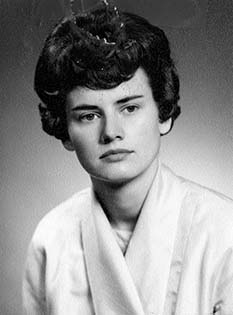 Marilyn Elizabeth Gutershloh Phelan was born on July 12, 1938 in Lubbock, Texas.
After attending Levelland High School she went on to receive her bachelor’s degree in political science
from Texas Tech in 1959. She then enrolled in law school at the University of Texas, where female students
comprised about 3% of the law program, and completed her degree in 1961 despite facing blatant gender
discrimination by law faculty and employers who did not approve of women in the profession. “It was irritating
that firms did not interview women. This was before the Civil Rights Act, and women did not have the equal
opportunities for employment as men did. We accepted the fact that we would be discriminated against. It did
not mean we didn’t like it, but there was little recourse,” Phelan recalled of the difficulties of trying to
find a job after graduating Law School. While at UT, she met fellow law classmate and West Texan, Harold Phelan.
The two married in 1960. From 1961-1966, the couple ran their own private law firm in Levelland and Marilyn
continued to battle gender discrimination, this time with clients who preferred having a male represent
them in legal matters.
Marilyn Elizabeth Gutershloh Phelan was born on July 12, 1938 in Lubbock, Texas.
After attending Levelland High School she went on to receive her bachelor’s degree in political science
from Texas Tech in 1959. She then enrolled in law school at the University of Texas, where female students
comprised about 3% of the law program, and completed her degree in 1961 despite facing blatant gender
discrimination by law faculty and employers who did not approve of women in the profession. “It was irritating
that firms did not interview women. This was before the Civil Rights Act, and women did not have the equal
opportunities for employment as men did. We accepted the fact that we would be discriminated against. It did
not mean we didn’t like it, but there was little recourse,” Phelan recalled of the difficulties of trying to
find a job after graduating Law School. While at UT, she met fellow law classmate and West Texan, Harold Phelan.
The two married in 1960. From 1961-1966, the couple ran their own private law firm in Levelland and Marilyn
continued to battle gender discrimination, this time with clients who preferred having a male represent
them in legal matters.
In 1967, she shifted her focus to raising three young children and also returned to Texas Tech to acquire master and doctoral degrees in business administration. She received her CPA certificate in 1968, started teaching as an instructor in the College of Business Administration in 1967, and was hired as a full-time assistant professor in 1971. Phelan embraced academic life, becoming Associate Dean of the Graduate School from 1973-1977 and teaching in the Texas Tech School of Law as a tenured professor in 1974. From 1977-1984 she served as General Counsel for the university, after which she returned to teaching full-time in the Law School as well as the Museum Science program.
In 1979, Phelan, then the highest-ranking woman in Texas Tech administration, was named Woman of the Year by Mortar Board and the Women in Communications, Inc. Over the next two decades she would author and co-author sixteen books on tax law and nonprofits, museum law, and cultural property and natural heritage law. In 2005, Phelan became the first woman from the School of Law to be promoted to the high rank of Horn Professor.
Related collections within the University Archives and the Southwest Collection holdings:
Marilyn Elizabeth Phelan faculty file, 1966-1990
Marilyn Phelan oral history interview [sound recording], 1998
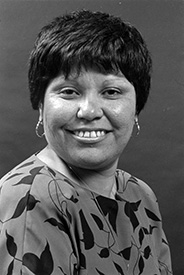 Maria Salas was born on June 27, 1943 in Pecos, Texas and raised by a single mom along with her five
siblings in a one-room house. At the age of 1 year and 2 months, she was stricken with polio but eventually recovered
enough to walk and graduate from Pecos High School as the first Mexican American Valedictorian in spite of being a
student who only spoke Spanish when she started school. Upon learning that Maria could not afford to go to college,
Mr. Kelly, the Principal, and others were able to secure financial support and housing for Maria to enroll at
Texas Technological College in the fall of 1962. She was part of a group of Hispanics that started the first
Hispanic student organization, Los Tertulianos. Maria graduated with a B.S. in Elementary Education in 1966.
Maria Salas was born on June 27, 1943 in Pecos, Texas and raised by a single mom along with her five
siblings in a one-room house. At the age of 1 year and 2 months, she was stricken with polio but eventually recovered
enough to walk and graduate from Pecos High School as the first Mexican American Valedictorian in spite of being a
student who only spoke Spanish when she started school. Upon learning that Maria could not afford to go to college,
Mr. Kelly, the Principal, and others were able to secure financial support and housing for Maria to enroll at
Texas Technological College in the fall of 1962. She was part of a group of Hispanics that started the first
Hispanic student organization, Los Tertulianos. Maria graduated with a B.S. in Elementary Education in 1966.
In 1967, Maria Rivas, now a single mom, was hired by Lubbock public schools. While a student and now as a teacher, Rivas concluded that students who do not speak English struggle to learn in an English only classroom and eventually drop out of school. In 1969, she and three other teachers were hired by LISD to teach in the first phase of the Bilingual Program, Bilingual Kindergarten. It was obvious to her that the students were more successful when taught the essentials in their native language while learning English as a Second Language.
In 1971, Rivas was hired by the Southwest Educational Development Laboratory to train paraprofessionals to implement a Bilingual Early Childhood program for 3, 4, and 5 year old migrant children. She earned her M.S. from Antioch College in 1975 and her Ph.D. from the University of Kansas in 1978. She was an assistant instructor and coordinator of the Bilingual Education program. Upon completion of her Ph.D., she was a Lecturer at the University of Texas at El Paso from 1979 - fall of 1980 and in the Spring of 1981, she was an Assistant Professor at Southwest Texas State University until 1983. In the Fall of 1983 when Texas Tech hired her as Assistant Professor, Maria served as Coordinator of the Bilingual Program. A strong advocate for Bilingual Education, she was involved in the Texas Association for Bilingual Education, served as president and coordinated the organization's 1990 very successful state convention held in Lubbock. In addition, she served in various local organizations and coordinated the first reunion of "Los Tertulianos" in Lubbock.
In 1984, Rivas married Dr. James "Jim" Goss, an anthropology professor at Texas Tech. Rivas is proud of her Texas Tech roots and her accomplishments. Her son, Dr. Sammy Rivas, is a Lubbock surgeon. She retired in 1990.
Related collections within the University Archives and the Southwest Collection holdings:
Maria Rivas oral history interview [sound recording], 2010
Related collections within the University Archives and the Southwest Collection holdings:
Maria Rivas faculty File, 1983-1986
Maria Rivas short self-biography from “First Texas Tech Los Tertulianos Hispanic Alumni Reunion,” November 13-14, 2009
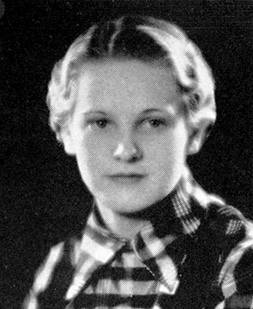 Catherine Royalty was born in Lubbock on February 17, 1915, to Walter “W.W.” Royalty and Lyda May Royalty.
Dr. M. C. Overton was the doctor that delivered her and remained her doctor until she was a young adult. When
the Locating Board visited Lubbock to review the city as a possible site for a new college that would later become
Texas Technological College, Catherine’s father, who owned one of the first car dealerships in town, loaned one of
his cars to tour members of the Locating Board around town. Catherine’s mother volunteered to serve as chauffer for
their company vehicle. Both Catherine and her mother attended Texas Tech in the 1930s. While her mother, who worked in the
campus post office, did not complete a degree, Catherine did, earning a bachelor’s degree in English in June of 1936.
Following graduation, she taught English and was a school librarian in Post.
Catherine Royalty was born in Lubbock on February 17, 1915, to Walter “W.W.” Royalty and Lyda May Royalty.
Dr. M. C. Overton was the doctor that delivered her and remained her doctor until she was a young adult. When
the Locating Board visited Lubbock to review the city as a possible site for a new college that would later become
Texas Technological College, Catherine’s father, who owned one of the first car dealerships in town, loaned one of
his cars to tour members of the Locating Board around town. Catherine’s mother volunteered to serve as chauffer for
their company vehicle. Both Catherine and her mother attended Texas Tech in the 1930s. While her mother, who worked in the
campus post office, did not complete a degree, Catherine did, earning a bachelor’s degree in English in June of 1936.
Following graduation, she taught English and was a school librarian in Post.
During World War II, Catherine, whose family had a history of military service during war, sold war bonds and distributed ration books. Desiring to do more, she enlisted in the U.S. Navy in the Women Accepted for Volunteer Emergency Service (WAVES), completed basic training in New York, and then worked in the fleet post office in San Francisco. She was honorably discharged from military service in February of 1946 after the war’s end, and returned home to Lubbock, where upon she enrolled in Texas Tech, under the GI Bill of Rights, to complete a master’s degree in Education in May of 1951. She was concurrently teaching English and journalism in various middle schools in Lubbock while working on her master’s degree, and would enjoyed a long teaching career until her retirement in May of 1977. Catherine turned 104 years old in February of 2019, and is believed to be the oldest living World War II veteran in Lubbock.
Related collections within the University Archives and the Southwest Collection holdings:
Catherine Royalty oral history interview [sound recording], 2019
See also:
Karin McKay, “Beloved teacher, Catherine Royalty, celebrates 100 years,” KCBD, February 18, 2015
Emily Harris,
Lubbock's Oldest Surviving Veteran Remembers Her Time Serving During World War II, Everything Lubbock.com, November 11, 2019
Glenys Young, “103-Year Old World War II Veteran Will Speak at Texas Tech on Friday,” Texas Tech Today, September 19, 2018
Glenys Young, “103-Year Old Alumna, World War II Veteran Witnessed Texas Tech’s History,” Texas Tech Today,
October 1, 2018
Glenys Young, “
Texas Tech's Oldest Alumna Catherine Royalty Dies at 105,” Texas Tech Today,
June 4, 2020
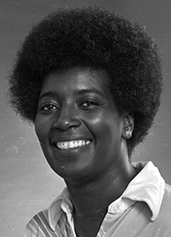 Jarvis Lavonne Scott was a world-class American sprinter and a track and field coach at Texas Tech University. Born in Waco, Texas, in 1947, Scott grew up in Los Angeles and started running professionally when she was just 20. Scott competed internationally for Team USA and was a four-time national champion. At the 1968 Olympics, Scott became the first Black woman to qualify for the 400- and 800-meter dash and placed sixth in the 400-meter dash.
Jarvis Lavonne Scott was a world-class American sprinter and a track and field coach at Texas Tech University. Born in Waco, Texas, in 1947, Scott grew up in Los Angeles and started running professionally when she was just 20. Scott competed internationally for Team USA and was a four-time national champion. At the 1968 Olympics, Scott became the first Black woman to qualify for the 400- and 800-meter dash and placed sixth in the 400-meter dash.
In 1975, she graduated from California State University-Los Angeles with a B.S. in Criminal Justice and then began working there as an assistant track coach and head cross country coach. She left in 1979 to accept a position at Tech as the women’s track and field coach. She oversaw the growth of women’s track at Tech and led the team to the NCAA Outdoor Tournament in 1989. She also helped attract Black athletes to Tech, many of whom found career success in track and field, including James Mays, Leonard Harrison, and Sharon Moultrie Bruner.
Scott quickly earned a reputation as a positive and skilled coach, and she was known among Texas Tech students for her energetic and motivational nature. “She was the most passionate coach I’ve ever, ever seen,” said Tim Torres, a Tech student manager from 1981-84. “She gave a hundred percent. I’ve never seen her give anything less than a hundred percent in anything she did.” She mentored men and women student athletes at Tech and worked as a lecturer at track workshops with Olympian Jesse Owens and UCLA track coach Jim Bush.
Active in her church and the Lubbock community, Coach Scott retired from Texas Tech in 1991, leaving behind a legacy of a thriving women’s track and field team. She passed away at age 70 in 2017. On February 16, 2022, Texas Tech’s track program announced the last regular season indoor track and field meet at the university would be named in her honor.
See also:
Texas Tech Introduces Inaugural Jarvis Scott Open, Texas Tech Athletics, February 16, 2022
Don Williams, Jarvis Scott, Olympian and Former Tech Coach, Dies at 70, Lubbock Avalanche-Journal, October 3, 2017
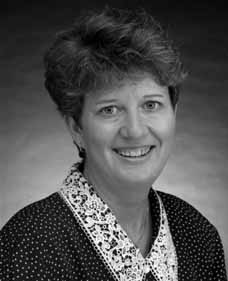 Marsha Sharp was born on August 31, 1952, and moved to Tulia, Texas, where she grew up playing three-on-three basketball.
She attended Wayland Baptist University and played guard for the Queen Bees for two years. During her junior year Sharp
began her coaching career when she took charge of the freshman team. After graduation Sharp stayed on as a graduate
assistant coach at Wayland for one season before earning her master’s degree from West Texas State University. She then
went on to Lockney High School as head coach of the Lady Longhorns, amassing a 126-63 record over six years.
Marsha Sharp was born on August 31, 1952, and moved to Tulia, Texas, where she grew up playing three-on-three basketball.
She attended Wayland Baptist University and played guard for the Queen Bees for two years. During her junior year Sharp
began her coaching career when she took charge of the freshman team. After graduation Sharp stayed on as a graduate
assistant coach at Wayland for one season before earning her master’s degree from West Texas State University. She then
went on to Lockney High School as head coach of the Lady Longhorns, amassing a 126-63 record over six years.
In 1981 she joined Texas Tech University as an assistant coach and, during her tenure, became one of the most celebrated coaches in the history of women’s college basketball. As head coach of the Lady Raiders from 1982 to 2006, Sharp elevated the women’s basketball program to national prominence. The Lady Raiders won eight conference titles (Southwest Conference and Big 12), had ten Sweet 16 and four Elite 8 appearances, and won the national championship in 1993. In all, Coach Sharp compiled a record of 572-189.
Her success was not limited to the game of basketball. Off the court she mentored her players to be their best. Under her guidance Coach Sharp’s student-athletes achieved an impressive 97 percent graduation rate. The Marsha Sharp Center for Student-Athletes, established in 2004, continues to provide student-athletes with academic services.
Though she retired from coaching in 2006, Sharp’s legacy continues. She is very much involved in the community. In her current position as Associate Athletic Director of Special Projects at Texas Tech, Sharp oversees the development of the Fearless Champions Leadership Academy and the Marsha Sharp Leadership Circle. She also serves on the boards of the Kay Yow Cancer Fund, the Lifecare Community, the Sharp Academy/Lubbock Learning Difference Center, and the Second Baptist Church. It is her commitment to excellence and giving back that has garnered her countless awards and accolades over her career on and off the court.
Related collections within the University Archives and the Southwest Collection holdings:
Marsha Sharp Reference File
Marsha Sharp oral history interview [sound recording], 2015
Michi Atkins oral history interview [sound recording], 2004
Brooke Baughman oral history interview [sound recording], 2007
Krista Kirkland Gerlich oral history interview [sound recording], 2003
Nichole “Nikki” Heath oral history interview [sound recording], 2005
Noel Johnson oral history interview [sound recording], 2003
Cynthia Clinger Kinghorn oral history interview [sound recording], 2003
Natalie Ritchie oral history interview [sound recording], 2003
Michelle Thomas oral history interview [sound recording], 2003
Dean Weese oral history interview [sound recording], 2001
Linden Weese oral history interview [sound recording], 2005
Melinda White oral history interview [sound recording], 2003
See also:
David Just, “Having a Ball, Ex-lady Raiders coach Sharp loves new position in athletic department as she gives
back to the community.” Lubbock Avalanche-Journal, February 15, 2012
Nancy Laine Price, Courtly Love: A Profile of Coach Marsha Sharp. Sweet Pea Press, 1994
Marsha Sharp, Tall Enough to Coach: Elements of Leadership for Coaching and Life. Bright Sky Press, 2004
Marsha Sharp bio on Tech Sports web page
The Lady Raiders and Marsha Sharp: 20 Years of Excellence. Texas Tech University, 2002 (51 pages)
George Watson, “
Marsha Sharp to speak at fall commencement ceremonies,” Texas Tech Today, October 12, 2015
Glenys Young, Campus Buildings Honor Legacies of Women.
Texas Tech Today, March 24, 2016
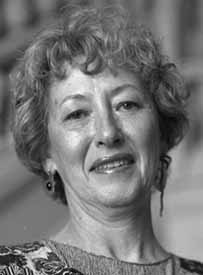 Born on August 1, 1936 in Peoria, Illinois, Gwendolyn Sorell attended public schools in Fort Worth and Grandview, Texas. She earned an undergraduate degree in liberal arts in 1976 from Goddard College, then attended graduate school at Pennsylvania State University where she earned a master’s and doctoral degree in human development and family studies in 1978 and 1982, between which time she completed postdoctoral research training in psychology at the University of Denver from 1981-1982 .
Born on August 1, 1936 in Peoria, Illinois, Gwendolyn Sorell attended public schools in Fort Worth and Grandview, Texas. She earned an undergraduate degree in liberal arts in 1976 from Goddard College, then attended graduate school at Pennsylvania State University where she earned a master’s and doctoral degree in human development and family studies in 1978 and 1982, between which time she completed postdoctoral research training in psychology at the University of Denver from 1981-1982 .
Dr. Sorell accepted a faculty position with the Department of Human Development and Family Studies in the Texas Tech School of Home Economics in 1983, specializing in the area of adulthood development. During the course of her career, she author or co-authored 27 publications, gave more than a 100 conference presentations, and served as a graduate supervisor for 24 master theses and 16 doctoral dissertations. The Women’s Identity Project, Sorell’s long-term research project focused on filling in the gap of adult development literature for women, provided students the opportunity to participate in adult development research.
In 1989, Sorell was appointed coordinator and director of the Women’s Studies Program, which started at Texas Tech in 1981. She was heavily involved in community service, serving on the board of directors for the Lubbock Rape Crisis Center, the West Texas AIDS Foundation, the Planned Parenthood Association, and the Special Services Advisory Board of the Equity Project at South Plains College. She also served as a consultant to groups such as the Department of Veterans Affairs Women’s Health Program, the Lubbock Substance Abuse Prevention Coalition, and LISD’s Drug Free Schools Project, and was a volunteer for Meals on Wheels. In 2004, when she stepped down as the Women’s Studies Program’s first director to return to full-time teaching, an endowed scholarship was established in her name in recognition of her leadership and fundraising efforts that led to the program’s steady expansion. Dr. Sorell passed away on March 23, 2009 at the age of 72 following a year and a half battle with cancer. She had one child, Leslie Alvarado.
Related collections within the University Archives and the Southwest Collection holdings:
Gwendolyn Thomas Sorell faculty file, 1982-1991
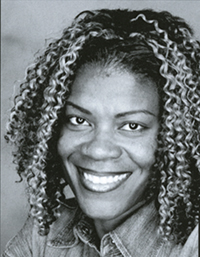 Born in 1971 in Brownfield, Texas, Sheryl Swoopes is one of the most recognizable Red Raider athletes of any sport. At Texas Tech, Swoopes became a national talent, leading the Lady Raiders to a 1993 national championship, the first in university history, under legendary coach Marsha Sharp. That year, Swoopes was named the Naismith College Player of the Year and Sportswomen of the Year.
Born in 1971 in Brownfield, Texas, Sheryl Swoopes is one of the most recognizable Red Raider athletes of any sport. At Texas Tech, Swoopes became a national talent, leading the Lady Raiders to a 1993 national championship, the first in university history, under legendary coach Marsha Sharp. That year, Swoopes was named the Naismith College Player of the Year and Sportswomen of the Year.
After leaving Texas Tech, Swoopes became the predominant face of women’s basketball. She won a gold medal for Team USA at the 1996 Olympics. The next year, the Houston Comets selected her as the fifth pick in the inaugural Women’s National Basketball Association (WNBA) draft, and Swoopes led the team to the first WNBA championship. During her career, she won the WNBA’s MVP award three times and four WBNA championships. Swoopes’ stellar performance led to a Nike contract, where she became the first women’s basketball player with a shoe line: the “Air Swoopes.” She was often compared to Michael Jordan and famously played him in 1 on 1.
After her professional basketball career, Swoopes came back to Texas Tech as a color analyst and Director of Player Development. She is recognized as a trailblazer in women’s basketball. Sports Illustrated named her one the most important women athletes of the early 2000s. She was inducted to the Texas Sports Hall of Fame, the Basketball Hall of Fame, and the Woman’s Basketball Hall of Fame. She remains one of the only women to have her number retired by Texas Tech.
Related collections within the University Archives and the Southwest Collection holdings:
Sheryl Swoopes reference file
Margaret E. Wilson Papers, 1935-2007 - files on Sheryl Swoopes, 1993-2007
See also:
Michael Burgan. Sheryl Swoopes, Philadelphia: Chelsea House Publishers, 2001
Pamela Grundy and Susan Shackelford, Shattering the Glass: The Remarkable History of Women's Basketball, The New Press, 2005
Jordan Ligons, Sheryl Swoopes Gets Back to Her Roots, Just Women's Sports, July 20, 2022
Steven J. Overman and Kelly Boyer Sagert. Icons of Women's Sport, Santa Barbara: Greenwood, 2012
Sheryl Swoopes, Greg Brown and Doug Keith. Bounce Back, Dallas: Taylor Publishing, 1996
Sheryl Swoopes 2004 Inductee, Texas Women's Hall of Fame, 2004
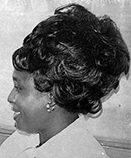 Born in 1928 in Houston, Texas, Hazel Scott Taylor received her bachelor’s degree from Prairie View A&M University before attending the Texas Tech University Graduate School. She received her master’s in education on August 22, 1964 and her doctoral degree on August 19, 1972. During her time as a graduate and doctoral student, Taylor was a member of Delta Sigma Theta Sorority. In July of 1971, she became the first recipient at Tech for the Ford Foundation Advanced Study Fellowship for Black Americans.
Born in 1928 in Houston, Texas, Hazel Scott Taylor received her bachelor’s degree from Prairie View A&M University before attending the Texas Tech University Graduate School. She received her master’s in education on August 22, 1964 and her doctoral degree on August 19, 1972. During her time as a graduate and doctoral student, Taylor was a member of Delta Sigma Theta Sorority. In July of 1971, she became the first recipient at Tech for the Ford Foundation Advanced Study Fellowship for Black Americans.
In her spare time, Taylor served on numerous committees and boards including the Lubbock Airport Board, the Young Women Christian Association Board, the Contact Lubbock Board, and the Board for the Lubbock League of Women Voters. She was a very involved member of the St. Luke Baptist Church, where she served as the Sunday school secretary chairperson of the Board of Christian Education, president of the Deaconess Board, and as a teacher of the Hope Circle in the Mission Two Society.
Taylor served as the county home demonstration agent for Milam County and briefly taught in the Muleshoe and Lubbock Independent school districts. On June 15, 1973, she formally accepted an invitation to join the faculty of Tech as Assistant Professor with a salary of $12,200. On February 5, 1979, Taylor was awarded tenure from the Board of Regents and promoted to the rank of Associate Professor effective September 1, 1979. Though retired in 1988, she continued to teach part-time at Texas Tech through the fall of 1989. She was also heavily involved in local community boards and committees. Dr. Taylor passed away in Lubbock on August 5, 1995.
Related collections within the University Archives and the Southwest Collection holdings:
Hazel Scott Taylor faculty file, 1972-1995
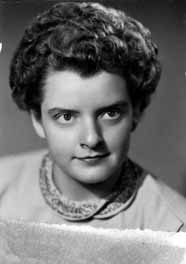 Mary Jeanne van Appledorn was born October 2, 1927 in Holland, Michigan, to John and Elizabeth van Appledorn.
As a child, van Appledorn studied piano, as did her older sister Ruth. Following the death of her father in 1944, she
and her mother moved to Topeka, Kansas (where her sister was a music teacher at Alma College) for van Appledorn's senior
year of high school. Van Appledorn graduated from Topeka High School in 1945 as valedictorian. She then went on to study
both piano and theory at the University of Rochester's prestigious Eastman School of Music in Rochester, New York,
where each year she was awarded the George Eastman Honorary Scholarship and in 1948 received her Bachelor of Music
with Distinction in piano. She subsequently received her Master of Music Degree (theory) from the Eastman School of Music
in 1950 and accepted a position at Texas Technological College (now Texas Tech University) in the fall of 1950.
She received her Ph.D. (music) from the Eastman School of Music in 1966.
Mary Jeanne van Appledorn was born October 2, 1927 in Holland, Michigan, to John and Elizabeth van Appledorn.
As a child, van Appledorn studied piano, as did her older sister Ruth. Following the death of her father in 1944, she
and her mother moved to Topeka, Kansas (where her sister was a music teacher at Alma College) for van Appledorn's senior
year of high school. Van Appledorn graduated from Topeka High School in 1945 as valedictorian. She then went on to study
both piano and theory at the University of Rochester's prestigious Eastman School of Music in Rochester, New York,
where each year she was awarded the George Eastman Honorary Scholarship and in 1948 received her Bachelor of Music
with Distinction in piano. She subsequently received her Master of Music Degree (theory) from the Eastman School of Music
in 1950 and accepted a position at Texas Technological College (now Texas Tech University) in the fall of 1950.
She received her Ph.D. (music) from the Eastman School of Music in 1966.
As an educator, Dr. van Appledorn taught at Texas Tech University from 1950-2008. She taught a wide range of courses during this time, from undergraduate music theory to graduate composition courses. Dr. van Appledorn served as chairman of the Division of Music Literature and Theory (1950-1968) in the school of music, and played an important role in the development of the curriculum of the undergraduate and graduate music degrees, alongside Chairman of the School of Music, Gene Hemmle. She also founded and served as chairman of the annual Symposium of Contemporary Music at Texas Tech (1951-1981), and obtained the commission of many new works by renowned composers such as Dr. Howard Hanson (Streams in the Desert, 1969). In 1989 she was promoted to the high rank of Horn Professor.
Related collections within the University Archives and the Southwest Collection holdings:
Mary Jeanne van Appledorn Reference File
Mary Jeanne van Appledorn faculty file, 1950-1993
Mary Jeanne van Appledorn Collection, 1912-2009
(63 boxes)
Mary Jeanne van Appledorn oral history interview
[sound recording], 1976
Mary Jeanne van Appledorn oral history
interview [sound recording], 2000
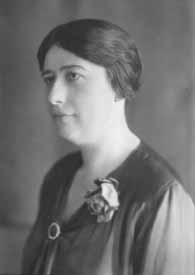 Margaret Watson Weeks was born on February 5, 1886, in Dartmouth, Nova Scotia, Canada. She began her career
teaching grade school in Canada and the United States and received her B.S. in home economics education and M.S.
degrees in nutrition from Columbia University in 1922 and 1925 respectively. During the formative years of the Texas Tech,
Weeks served as the Dean of the Home Economics Department from 1925-1953.
Margaret Watson Weeks was born on February 5, 1886, in Dartmouth, Nova Scotia, Canada. She began her career
teaching grade school in Canada and the United States and received her B.S. in home economics education and M.S.
degrees in nutrition from Columbia University in 1922 and 1925 respectively. During the formative years of the Texas Tech,
Weeks served as the Dean of the Home Economics Department from 1925-1953.
Her many contributions included helping to organize the Home Economics Club in 1925; establishing the Home Economics Loan Fund; helping to form the Double Key Honor Society in 1930; and the first Texas chapter of the Phi Upsilon Omicron National Honor Society in 1938. With Mary Woodward Doak, Weeks inaugurated the Women’s Recognition Service in 1932 which continued until 1947. She was also responsible for successfully orchestrating the construction of an addition to the Home Economics Building in 1952 and a women’s dormitory built in 1958 was named after her as well.
Related collections within the University Archives and the Southwest Collection holdings:
Margaret Watson Weeks Reference File
Margaret Watson Weeks faculty file, 1925-1953
Margaret Woodward Weeks Papers, 1925-1967(1 box)
See also:
Glenys Young,
Campus Buildings Honor Legacies of Women, Texas Tech Today, March 24, 2016
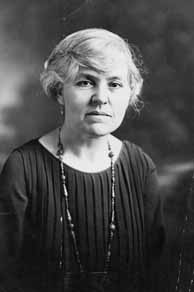 A librarian, educator and historian, Elizabeth Howard West served as the first librarian at Texas
Technological College in 1925 and founded the Lubbock branch of the American Association of University Women (1926).
Born in Pontotoc, Mississippi, on March 27, 1873, West received a degree from the Industrial Institute and College at
Columbus, Mississippi. She taught in the public schools before moving to Texas in 1895. She received both her bachelor's
and master's degrees from the University of Texas in 1901. She began her library training in 1905 and became a
cataloger at the Texas State Library in 1906. West also worked as an assistant at the Library of Congress, was the Texas
State Library archivist (1911-1915), the director of the San Antonio Library (1915-1918), and elected as State
Librarian in 1918, making her the first woman department head in the Texas state government.
A librarian, educator and historian, Elizabeth Howard West served as the first librarian at Texas
Technological College in 1925 and founded the Lubbock branch of the American Association of University Women (1926).
Born in Pontotoc, Mississippi, on March 27, 1873, West received a degree from the Industrial Institute and College at
Columbus, Mississippi. She taught in the public schools before moving to Texas in 1895. She received both her bachelor's
and master's degrees from the University of Texas in 1901. She began her library training in 1905 and became a
cataloger at the Texas State Library in 1906. West also worked as an assistant at the Library of Congress, was the Texas
State Library archivist (1911-1915), the director of the San Antonio Library (1915-1918), and elected as State
Librarian in 1918, making her the first woman department head in the Texas state government.
West had actively pursued research in Spanish and Mexican archives, and from 1930 to 1932 worked as a Library of Congress research assistant on the European Historical Mission. She published frequent articles in the Southwestern Historical Quarterly and the American Historical Review. She was a charter member of the Texas State Library Association and served as its president from 1914 to 1916. She also helped to found the Southwestern Library Association and was a member of Phi Beta Kappa, Delta Kappa Gamma, Daughters of the American Revolution and the Philosophical Society of Texas. West also directed the Southwestern Library Association's Regional Literature Program in Texas. She retired as college librarian at Texas Tech in 1942 and then worked as a historical research assistant for the Tech history department until 1947. Following a heart attack, West completely retired and moved to Pensacola, Florida, where she died on January 4, 1948.
Related collections within the University Archives and the Southwest Collection holdings:
Elizabeth Howard West Reference File
Elizabeth Howard West faculty file, 1923-1948
Elizabeth Howard West
Papers, 1835-1939 and undated (1 box)
Elizabeth Howard West, 1924-1930 (see
U 147.5 President's Office Records
Elizabeth Howard West, 1934 (see
U 147.13 President's Office Records
Goldia Hester Papers, 1901-1965 (1 wallet)
Virginia West oral history interview [sound recording], 1964
Ilse Hildegarde Wolf Papers, 1926-1942
See also:
Ruth Horn Andrews, The First Thirty Years: A History of Texas Technological College, 1925-1955
David B. Gracy, II, The State Library and Archives of Texas: A History, 1835-1962 (Chapter 2)
Goldia Ann Hester, Elizabeth Howard West: Texas Librarian. Austin: University of Texas, 1965 (Thesis)
Dorman H. Winfey, "Elizabeth Howard West."
The Handbook of Texas Online
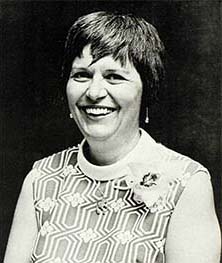 Margaret Eileen "Peg" Wilson received her B.S. and M.S. degrees from the University of
Arkansas and her Ph.D. from the University of Iowa. She joined the Department of Health and Physical Education at
Texas Tech University in 1965 following several years of teaching at both the secondary and college level in the
state of Arkansas. Her administrative duties at Texas Tech included serving as Department Chair from 1967-1976
and as Coordinator of the Physical Education Division from 1976-1983.
Margaret Eileen "Peg" Wilson received her B.S. and M.S. degrees from the University of
Arkansas and her Ph.D. from the University of Iowa. She joined the Department of Health and Physical Education at
Texas Tech University in 1965 following several years of teaching at both the secondary and college level in the
state of Arkansas. Her administrative duties at Texas Tech included serving as Department Chair from 1967-1976
and as Coordinator of the Physical Education Division from 1976-1983.
Wilson also served as President of the Texas Tech Faculty Senate from 1978-1979 and again from 1985-1986. During her time in the faculty senate, she worked to resolve conflict between President Lauro Cavazos and Texas Tech faculty over controversial tenure policies. As one of the pioneers in Texas Tech women's athletics, Wilson worked to obtain equal resources for women athletes. She was an active member of TAHPERD (Texas Association for Health, Physical Education, Recreation and Dance). Wilson retired from Texas Tech University in 1990.
Related collections within the University Archives and the Southwest Collection holdings:
Margaret Eileen Wilson faculty file, 1965-1990
Margaret E. Wilson Papers, 1935-2007 (19 boxes)
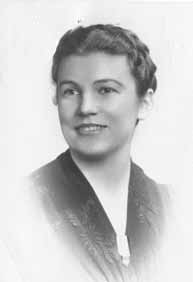 Mina Marie Wolf was born on August 14, 1910, at Sagerton, Texas, and attended public schools in Stamford, Texas,
from 1920-1929. From 1929-1932, she attended the newly established Texas Technological College in Lubbock, Texas,
from which she received her B.A. in chemistry in 1932. While in graduate school at the University of Texas Mina was
discouraged from pursuing a career as a chemist by a faculty member due to the difficulty of finding jobs in that field
for a female. She returned to Texas Tech in 1935 to get her M.S. in Foods and Nutrition and served as an instructor for a
semester. She returned to Texas Tech in 1940 to be an associate professor in the foods and nutrition department of Home
Economics and received her Ph.D. in Nutrition and chemistry from Columbia University in 1942.
Mina Marie Wolf was born on August 14, 1910, at Sagerton, Texas, and attended public schools in Stamford, Texas,
from 1920-1929. From 1929-1932, she attended the newly established Texas Technological College in Lubbock, Texas,
from which she received her B.A. in chemistry in 1932. While in graduate school at the University of Texas Mina was
discouraged from pursuing a career as a chemist by a faculty member due to the difficulty of finding jobs in that field
for a female. She returned to Texas Tech in 1935 to get her M.S. in Foods and Nutrition and served as an instructor for a
semester. She returned to Texas Tech in 1940 to be an associate professor in the foods and nutrition department of Home
Economics and received her Ph.D. in Nutrition and chemistry from Columbia University in 1942.
Mina married Arch Lamb in 1941 and together the couple left a lasting impression on Texas Tech history through their long standing support for the college and its students. Dr. Mina Lamb was a member of numerous professional and local campus organizations. During the war years she taught numerous Red Cross nutrition and canteen courses as well as served on the Food Ration Board in Lubbock. Before her retirement from Texas Tech, Dr. Lamb had been honored as a Piper Professor in 1965 and had donated $10,000 towards funding a new laboratory for assessment of nutritional status in humans. In an interview in 1990, she stated that her proudest accomplishment was establishing the federally funded Women, Infants and Children (WIC) supplemental food program at the Lubbock Children’s Health Clinic where she had volunteered for 18 years as a teacher of nutrition.
Related collections within the University Archives and the Southwest Collection holdings:
Mina Wolf Lamb Reference File
Mina Wolf Lamb faculty file, 1938-1975
Mina Wolf Lamb Papers, 1942-1946 (1 wallet)
Mina Wolf Lamb Papers, 1926-1942 (1 wallet)
Arch G. and Mina Wolf Lamb Papers, 1832-2002 (64 boxes)
Ilse Hildegarde Wolf Family Papers, 1878-1973
Ilse Hildegarde Wolf Papers, 1926-1942
Back to the Guide to
Women's Resources in the University Archives page
Back to the University Archives'
Texas Tech History Pages
Contact the University Archivist
